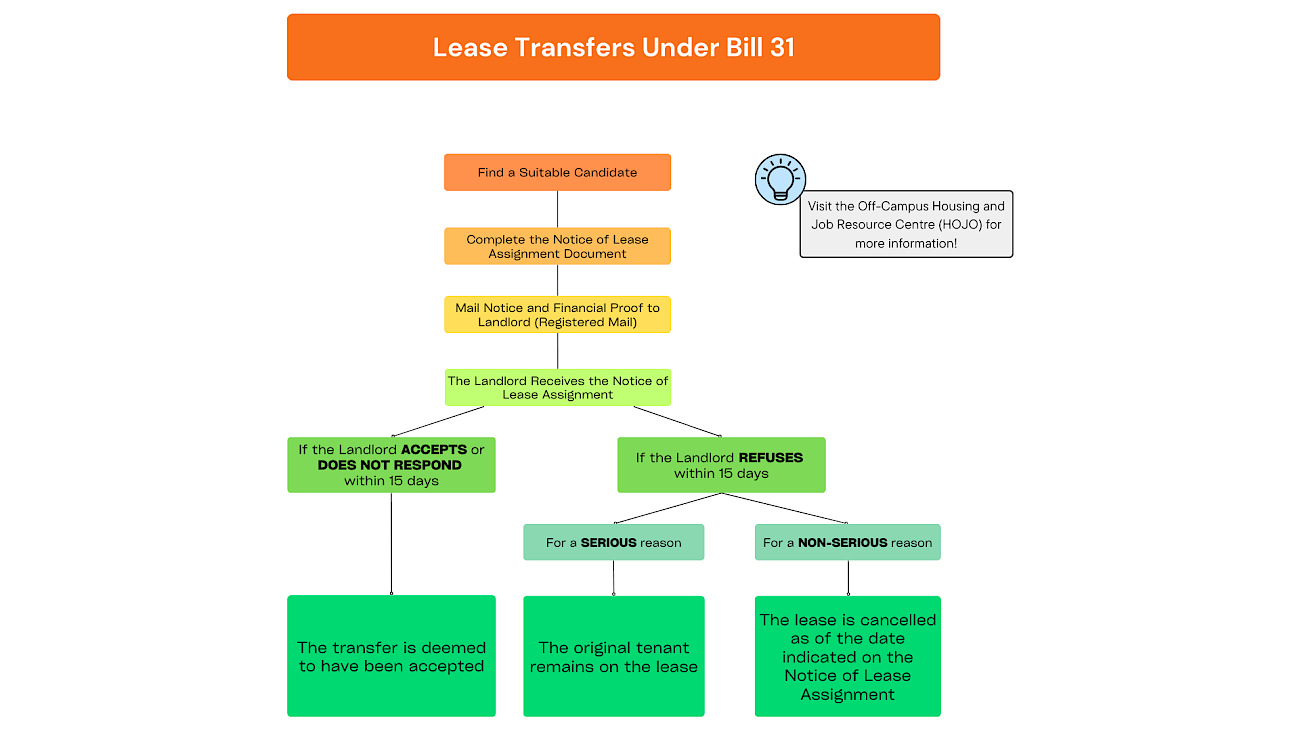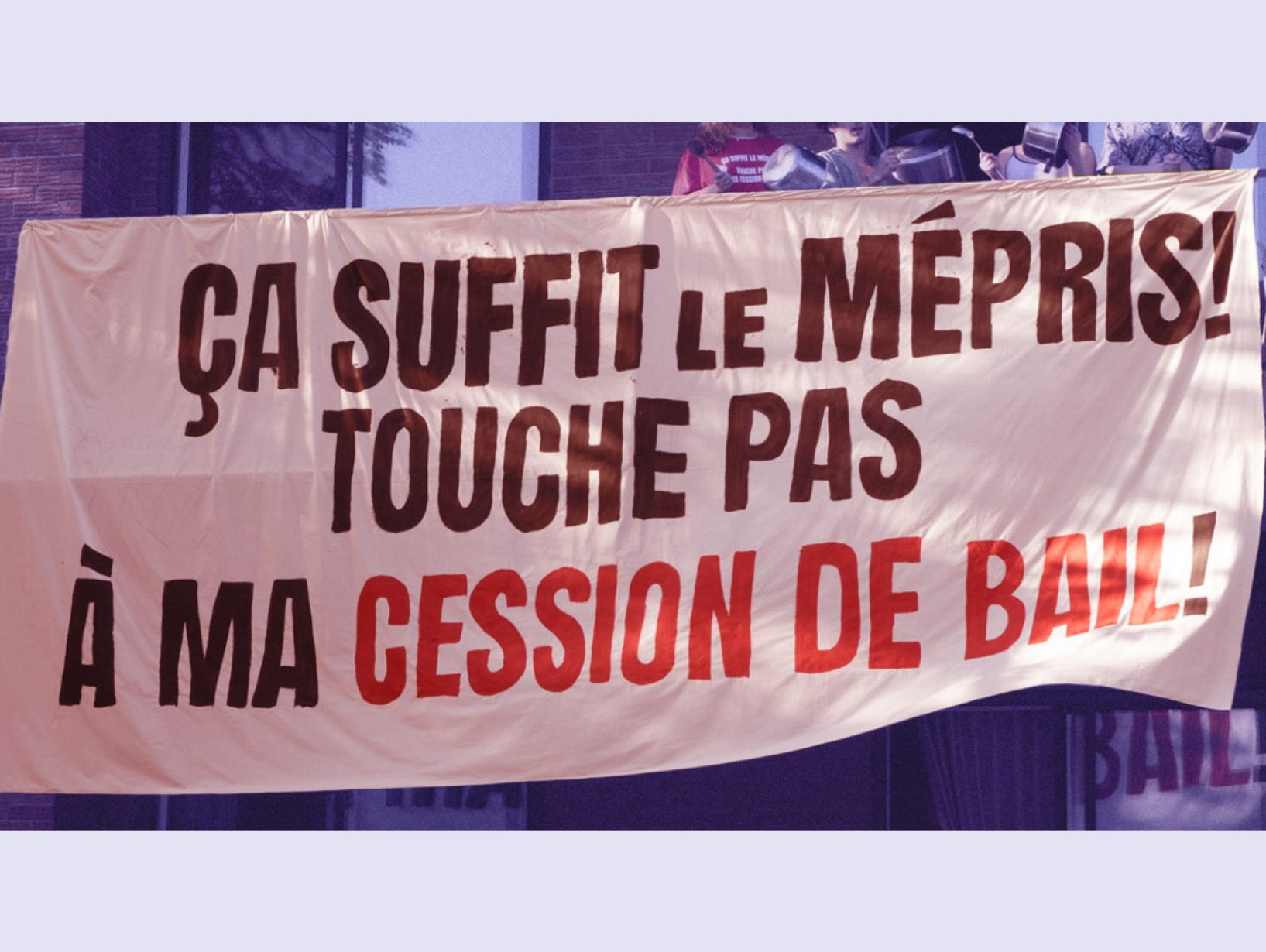Lease Transfers Under Bill 31: What You Need to Know

Despite strong opposition from tenants’ rights groups and renters across the province, Quebec’s controversial Bill 31 was voted into law on February 21st 2024. Bill 31, An Act to amend various legislative provisions with respect to housing, brings several important changes to the way tenancy operates in the province of Quebec, altering—and, in some cases, restricting—tenants’ rights.
Since Bill 31 was first tabled, several news outlets began mistakenly reporting that the bill would would effectively abolish lease transfers in Quebec, but that is incorrect: lease transfers remain a legal practice in Quebec. That said, lease transfers are now subject to certain restrictions which may make it more difficult in some cases to transfer your lease.
Today we will be highlighting Bill 31’s modifications to lease transfers: a tool that Quebecers have relied on for decades to facilate housing access and keep apartments affordable.
WHAT ARE LEASE TRANSFERS?
A lease transfer, also known as lease assignment, is a process through which a tenant assigns their lease and their apartment to another individual.
This individual becomes the tenant for all intents and purposes: they take over the apartment on a date that is agreed upon by both parties and accept all terms outlined in the lease. They also take on all tenant responsibilities such as paying the rent on time and keeping the unit in good condition.
The tenant who transfers their unit, for their part, relinquishes all their rights as a tenant, including the right to maintain occupancy.
It is typically not necessary to draw up a new lease in the event of a lease transfer: any instances of the previous tenant’s name simply refer to the lease assignee going forward.
Lease transfers offer several benefits to renters:
- Flexibility: Lease transfers allow tenants to get out of their lease early—in other words, outside of the lease renewal period.
- Rent Control: Lease transfers are one of the only tools at renters’ disposal to exert control over the rental marking and keep rental rates low. Unfortunately, no government-mandated rent control exists in Quebec.
- Access: Lease transfers have been a reliable way of facilitating access to the rental market for people who have no credit history or who are first-time renters.
WHAT IS THE LEASE TRANSFER PROCESS, STEP-BY-STEP?
To initiate a lease transfer, a tenant would first have to find a suitable candidate to take over their lease. The candidate should be someone trustworthy who will respect the property and who has the means to pay the rent in full each month.
Once a suitable candidate has been chosen, the tenant must then complete the Tribunal administratif du logement’s (TAL) “Notice of Lease Assignment” document, which can be found here, and deliver it to the landlord to notify them of the tenant’s intention to assign their lease. Along with the notice, the tenant may wish to include some documents establishing the prospective lessee’s character and financial habits, such as a letter of recommendation from a previous landlord, a guarantor letter, or a credit report.
The Notice of Lease Assignment should be sent to the landlord by registered mail through Canada Post. That way, the tenant will receive a tracking number which will allow them to view the specifc date and time at which the letter was picked up. Alternatively, the tenant could deliver the Notice of Lease Assignment by hand and have the landlord date and sign a copy for each of them.
Once the landlord has received the Notice of Lease Assignment, the ball is now in their court. If the landlord wishes to refuse the lease transfer, they must communicate this refusal (and their reasons for doing so) to the tenant within fifteen days since they received the Notice of Lease Assignment; if the landlord fails to do so, the lease transfer is deemed to have been accepted.
WHAT HAS CHANGED NOW, UNDER BILL 31?
Prior to Bill 31, a lease transfer could only be refused for a serious reason, such as problematic behaviour or an inability (or perceived inability) to pay rent. A landlord could not refuse a tenant’s lease transfer request simply because they didn’t feel like it, or because it is too much of a hassle, or because they don’t like the tenant. All of these non-serious reasons would have been considered invalid.
As of February 21st 2024, a landlord can still refuse a lease transfer for a serious reason; in that case, the lease continues with the original tenant. However, landlords can also refuse lease transfers for a non-serious reason now. In the event that a lease transfer is refused for a reason other than a serious one, the lease is cancelled from the date which the transfer would have taken effect (as indicated by the tenant in the Notice of Lease Assignment document).

HOW WILL THIS EFFECT TENANTS GOING FORWARD?
Unfortunately, the introduction of non-serious reasonsas a valid justification for a lease transfer to be refused places further restrictions on Montreal tenants who already find themselves in the midst of a housing crisis.
The primary purpose of lease transfers has been to help renters get out of a lease on short notice—or conversely, to help non-tenants find an apartment sooner. But an added benefit of this practice was that it kept rental prices relatively affordable compared to other Canadian metropolises.
When a tenant terminates their lease and moves out of their apartment, the landlord has the opportunity to raise the rent for the unit. But when a lease is transferred to someone, that person takes over the lease at the same conditions and the same rental price, thus keeping the rent stable.
Bill 31 has only been in effect for just over five months, so we’ll have to wait a bit longer for data on how the bill has affected the Montreal housing market; but allowing landlords to deny tenants of the ability to transfer their leases amongst themselves will most likely cause Montreal’s once-affordable apartment prices to skyrocket even more overtime, much like they have in other Canadian cities like Vancouver and Toronto.
For more information or help transferring your lease, contact the Off-Campus Housing and Job Resource Centre (HOJO)! You can drop in at our office (H-224) during opening hours or shoot us an email at hojo@csu.qc.ca .
Stay tuned for more articles breaking down Bill 31!
